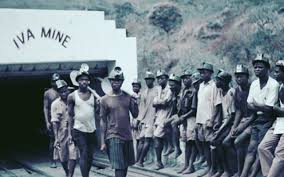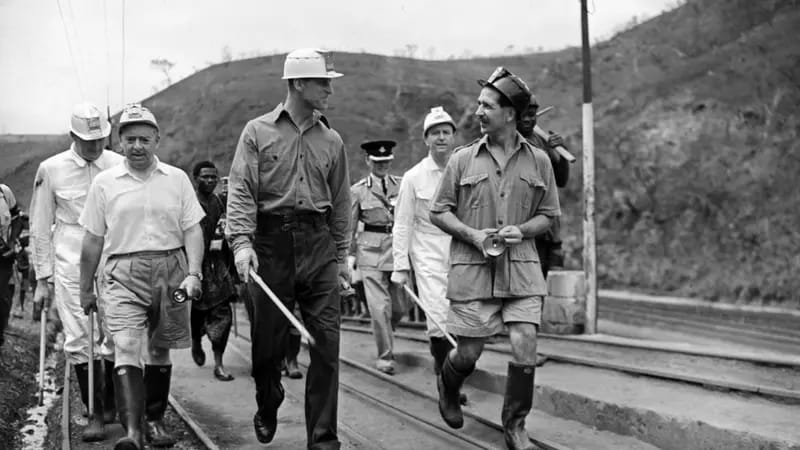Economic Exploitation and Forced Labor
British Colonial Economic Exploitation and Forced Labor in Igboland
"They came with gunboats, and they left with our gold, oil, raw materials, our bodies, and our dignity."
From the late 19th century through to Nigeria's independence in 1960, British colonial rule was sustained not by benevolence, but by brutal economic extraction. Nowhere was this more evident than in Igboland, where indigenous communities were systematically robbed of their labor, land, resources, and freedom — all to enrich the British Empire and its corporate allies.
The Foundation of Exploitation: "Conquest as Commerce"
Following the Aro Expedition (1901–1902), British troops violently subdued resistance across Southeastern Nigeria, establishing what they termed "peace" — in reality, a military-enforced monopoly over local trade. Igbo people, once autonomous traders, farmers, blacksmiths, and artisans, were now forced into a cash economy designed to benefit colonial Britain.
Key Elements of Exploitation:
- Imposed Cash Crops: Igbo farmers were pressured to abandon food cultivation for export-oriented crops like palm oil, cotton, and rubber — materials in high demand in British factories.
- Monopoly Trading Firms: Companies like the Royal Niger Company and later United Africa Company (UAC) set exploitative prices, often paying peanuts for valuable goods.
- Taxation Without Representation: The infamous head tax introduced in 1928 forced Igbo households to earn colonial currency — pushing them into labor for foreign companies or government projects.

British colonial officials inspecting railway infrastructure built with forced labor in Eastern Nigeria
Forced Labor and "Public Works" That Served Empire
Colonial administrators implemented a system of compulsory labor masked as "native development." In reality, it was a form of modern-day slavery.
Examples:
1 Railways, Roads, and Ports
Constructed not for local benefit but to extract resources and move British goods inland. Entire villages were compelled to send men to work under appalling conditions, often without pay or adequate food.
2 Coal Mining in Enugu
Men worked deep in the mines of Iva Valley and Obwetti, risking death daily while British companies exported profits abroad. Safety gear was absent, wages were low, and dissent was met with the gun — as seen in the 1949 Iva Valley Massacre.
3 Women's Forced Participation
Women were dragged into colonial taxation and forced labor schemes — leading to massive protests like the 1929 Aba Women's War, where many were killed for resisting.

Workers at the entrance of Iva Mine, where many Igbo men were forced to work in dangerous conditions

Coal miners in Eastern Nigeria working in harsh conditions with minimal safety equipment
Structural Theft Through Colonial Laws
British legal instruments were designed to strip Indigenous people of ownership over their ancestral lands and economic agency.
- Land Ordinances (1916–1920s): Declared all land as Crown land, allowing colonial agents to seize and lease out Igbo farmlands to foreign firms.
- Customs and Excise Exploitation: Hefty taxes were imposed on imported necessities while British goods flowed in duty-free or subsidized, stifling local industries.
Extraction by Proxy: British Firms and State-Backed Greed
The British colonial state partnered with corporations like:
BP (then Anglo-Iranian Oil Company)
Conducted early surveys in southern Igbo areas, with land appropriations without consent. This was later to have damning consequences for the Igbos. The land survey actually informed the British colonial power of large deposits of crude oil.
Lever Brothers (now Unilever)
Dominated palm oil production through oppressive pricing and monopolistic control.
These companies enjoyed state military protection, and their operations were backed by British trade policies written to cripple indigenous competition.
Resistance and Consequences
Every economic structure forced upon the Igbo was met with resistance:
- Secret societies, strikes, sabotage of colonial offices, and legal petitions were used.
- Many resisters were imprisoned, exiled, or executed.
- Oral histories recall men buried alive for refusing to abandon their farms and women raped or beaten for protesting taxes.
Evidence & Citations (For Use in Legal Briefs & Petitions)
- British National Archives, CO 583/167/3 (on forced labor in Nigeria).
- "The Aba Riots" by Judith Van Allen, Canadian Journal of African Studies (1976).
- G. I. Jones, The Trading States of the Oil Rivers.
- Toyin Falola & Matthew Heaton, A History of Nigeria (Cambridge University Press).
- National Archives of Nigeria, Enugu: Iva Valley Records, 1949.
- Oral Testimonies: [– Survivor Testimony Template here].
- Legal Briefs: [– PDF Download of Economic Crimes by the Crown in Igboland].
Why This Still Matters
The colonial system was not simply unjust — it was criminal. The British Empire extracted billions in wealth while leaving behind poverty, conflict, and destroyed systems of self-sufficiency. The Igbo people, once commercially dominant in West Africa, are still recovering from deliberate economic underdevelopment seeded by colonialism.
